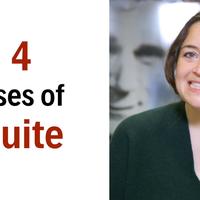4 uses of quite - English In A Minute - YouTube
4 Verwendungen von ziemlich - English In A Minute - YouTube
4 uses of quite - English In A Minute - YouTube
4 utilisations de quite - English In A Minute - YouTube
4 usi di quite - Inglese in un minuto - YouTube
4 uses of quite - English In A Minute - YouTube
4 utilizações de quite - Inglês Num Minuto - YouTube
4 варианта употребления слова quite - English In A Minute - YouTube
4 use of quite - English In A Minute - YouTube
4 вживання quite - English In A Minute - YouTube
quit 的 4 种用法 - 一分钟英语 - YouTube
Hi everyone, Sam here.
Hola a todos, Sam aquí.
And in this lesson,
Y en esta lección,
we're going to look at 4 different uses of 'quite'.
vamos a ver 4 usos diferentes de 'quite'.
We use 'quite' before an adjective or adverb
Se utiliza 'quite' antes de un adjetivo o adverbio
to mean 'less than very, but more than a little'.
para significar "menos que mucho, pero más que poco".
It's quite cold and it's raining quite heavily today.
|||||||forte|
Hace bastante frío y hoy llueve bastante.
We can use 'quite' before a verb
Podemos utilizar 'quite' antes de un verbo
– often the verbs 'like' and 'enjoy'.
- a menudo los verbos "gustar" y "disfrutar".
I quite like watching football but I don't love playing it.
Me gusta bastante ver fútbol, pero no me encanta jugarlo.
We can use 'quite a' before an adjective + noun.
Podemos usar 'quite a' antes de un adjetivo + sustantivo.
My brother is quite a good musician.
Mi hermano es muy buen músico.
But if we take the adjective away,
Pero si le quitamos el adjetivo,
and just have 'quite a' + noun,
y simplemente tener 'bastante' + sustantivo,
the meaning changes.
el significado cambia.
My brother is quite a musician,
Mi hermano es todo un músico,
which means 'my brother is a very good musician.
que significa "mi hermano es muy buen músico".
He's impressive.
Es impresionante.
So quite is quite useful, isn't it?
Así que es bastante útil, ¿no?

